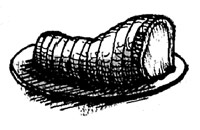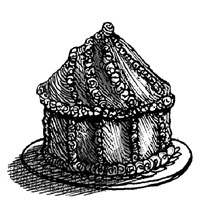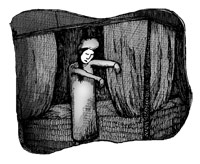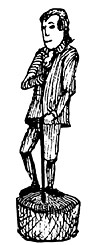The Christmas Frolick
And Sing and Tell Stories Together
Online Extras
Christmas Frolick Word Search

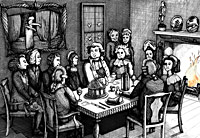
Richie Gunn
Crackling fires, ghosts—in human and mutton form—husbands carved in wood; and Twelfth Night cakes all figure in The Christmas Frolick, tales to entertain family and friends during the holiday season.
If, by 1775, the most forward American rebels contemplated breaking the political bands that connected their colonies with England—and they did—they knew that the acids of transatlantic politics could not entirely dissolve the ancient ties of custom and culture. That suggests one of the reasons the second and final conciliatory appeal from the Continental Congress to the inhabitants of Great Britain was that June addressed to “Friends, Countrymen and Brethren!”
The traditions of the winter holidays were part of the inheritance they shared. And cherished. If, on either side of the ocean, the Yuletide had not become as large a season of celebration as it would in the century to come—and it hadn’t—it was in the eighteenth a common Anglo-Saxon occasion of merriment, family fellowship, and good will. In that spirit, and on the hope of turning a shilling per copy, in the final year of shared sovereignty one G. Allen had printed, in London’s Paternoster Row, a seventy-two-page pamphlet, to be sold by all “Booksellers, Stationers, and News carriers,” titled:
The Christmas Frolick; or,
Mirth For The Holidays Consisting of
A great Number of admirable Stories never before
printed; with a select Collection of others, for
rare, old, and scarce Books …
The whole calculated to warm the Imagination,
raise the Spirits in the Gloom of Winter, and
procure, what every one wishes,
A MERRY CHRISTMAS, and a HAPPY NEW YEAR
Who’d fail to be merry that could be?
Who’d wish to be dull in dull Weather?
Let us all be as gay as we should be
And Sing and tell Stories together.
Whether imprints of the booklet reached the New
World in time for that final British American Christmas,
there is no ready way to tell. But when they did,
and at least one did, it is not too far to think that
American readers would see in the English production
something shared. The twenty-four stories that
The Christmas Frolick presents—a half dozen of
which are here reproduced as close to their original
titles, capitalizations, punctuations, and spellings as
a computer permits—are secular, sometimes ribald,
often moral, and nearly devoid of religious content.
G. Allen began:
TO THE READER
If the following Collection should be found to answer, in any degree, the Title of our Book, it is presumed that no Apology need be made for its Publication, at this season of Mirth and Festivity. Story-telling is a great help and Life to Conversation. We have endeavoured to select such Stories from the best Writers, as will not disgrace those who relate them. Indeed several of them are totally new, and it must be left to our Readers whether or not they think proper to make those the subject of their Narrations. Almost all our Songs and Jests are also such as have never been printed before. The Anecdotes and Characters are written by the ablest Hands this Kingdom ever produced; it need scarcely be said that ADDISON is the Author of many of them.
Nothing now remains but to wish our Readers as many MERRY CHRISTMASTIDES, and as many HAPPY NEW YEARS as Health, Plenty, and good-humor, can jointly promise or procure.
STORY I.
A Christmas Tale
In the Year 1753, a large and respectable Company of young ladies and Gentlemen were assembled to spend the Christmas Day, at the House of Colonel Woodford, in Hampshire. The Colonel had been a gay Man in his time; but his Ideas were elegant, his sentiments pure, and his Heart uncontaminated by his commerce with the World.–His Estate was ample, and the economy with which he manag’d it did him singular honour. His first Pleasure was to see his own Family happy, his second to make happy those around him.— When the Family had dined, the cheerful Glass had circulated, Tea and Coffee had been drank, and even Cards grew tiresome, the Company viewed Colonel Woodford with anxious Eyes, as hoping from his good Sense and Experience, a more rational Entertainment than Feasting or Card-Playing could afford. The Colonel read their Wishes in their Looks, and without waiting for farther entreaty, said, “Let us chat an Hour, my Boys and Girls. What think you of Story-telling for a Christmas Amusement? I will tell you a Piece of the History of my own Life, (thank God and my Harriet it has been a happy Life thus far,) and you shall take a Lesson from our Conduct for your own, if you think our Example worthy of being copied.” —The Company expressed their Wishes that he would proceed; which he did to the following Purport.
“I was the younger Son of the Revd. Dr. Woodford, of Staffordshire. To say any thing of my Father would be saying too little, unless I bestowed on him all the Praises due to Humanity elevated to the highest degree of Perfection. I was intended for the Church; and of consequence educated so as to prepare my passage to the University; but my Inclination leading me to the Profession of Arms, I prevailed on my Grandfather to purchase me a Cornetcy in a Regiment of Horse. It would be as impertinent to this Company, as troublesome to myself, to relate by what gradations I rose almost to the first Honours of my Profession. Suffice it to say that I was not deficient in what I thought the discharge of my Duty, and that my gracious Sovereign has more than rewarded my Endeavours. In the Year 1733, I was quartered in the City which gave birth to my Harriet. I had then never seen her: but an Accident, which for that reason I shall ever deem propitious, introduced me to her knowledge. A Company of Players had taken up their Residence, to entertain us during the Christmas Holidays—Accident placed me in the same Box with my Harriet.—The House was crowded; for the People of Fashion had made a Point of attending, to enable the Actors to feast thro’ the Season of Festivity. In the Middle of the fourth Act, the Word Fire occurred in one of the Lines. The Actor spoke with too elevated a tone of Voice. A Lady who heard, but did not understand him, mistook the elevation of his Voice for a cry of “Fire.” —The alarm soon spread, and ill-founded as it was, spread with Rapidity.—Every one was anxious to save him or herself.—A Coxcomb Lover (pardon me, my dear) who attended my Harriet, ran off in the first hurry, and left his precious Charge behind him.—My Eyes had before drank in the bewitching Charms of her Beauty—She was hurrying to the Door: I saw the danger of her being crushed to death; and pressing to her Assistance, repell’d, by mere force, the weight of several People that would have fallen on her.—I catched her in my Arms, and crying, “Tis all a mistake, Madam”—repeated the whole Sentence of the Play in which the Word fire occurred,—By this time two of the Players had come forward, and assured us that we were safe.—With difficulty I prevented my Harriet from fainting.—She recollected herself, and remained in her Place.—Of those who crowded to get out, several were terribly bruised, two had their Limbs broke, and one was killed. A Lady who received no apparent damage at the time, languished for two Months and then died.—I had the honour of attending my Harriet to her Father’s, and received too many acknowledgements for having conferred a common Obligation. I was honoured with an Invitation to visit the Family—the cowardly Lover never renewed his Visit; not even to enquire after the Lady’s Health. Suffice it to say, that I was honoured with her Confidence— Her Love—within three Months I was made the happiest Man living; and if my Charlotte (bowing to his Daughter) continues, as she has begun, to copy her Mother’s excellent Example, she cannot fail of becoming one of the happiest of Women.”
This Tale, which was intended merely as a Christmas Entertainment, was productive of a very agreeable Consequence. Among the Company present was Sir George Newport. His Eyes struck fire at the Praises the Colonel bestowed on Charlotte.—He loved her on the Instant. There could be no Objection to Sir George’s Birth, Fortune, Person, or Character. A speedy Marriage ensued; and last June made Colonel Woodford one of the happiest Grandfathers in the World.
To understand the next selection, definitions are in order. “Scragg” is an eighteenth-century spelling of a word that denoted the lean and inferior end of a neck of mutton. The verb “lay,” in the context of the tale, means to prevent a spirit from appearing. A “loadstone,” these days spelled “lodestone,” is a magnetic lump of iron.—Ed.
STORY VI.
An Instance of the Ridiculous.
Among the many people who have had Courage and Learning to lay Ghosts, G. W. Salomine, may be reckoned and esteemed the most considerable and knowing; for he made a Fortune and raised an Estate by this very Trade; and is said to have laid 1379 Souls in Red Sea: A Place which I know by Experience, and by Examination have found all Ghosts and Spirits are most afraid of; and this I think proves Salomine’s Power to be very great, as it is a Place they would not but by force have went into.
It is to be remarked that Salomine was the seventh Son of his Father and Mother, who was a virtuous Woman; and he had also a wonderful faculty of curing all diseases with a touch. Such surprising Power is there in some People. Yet this Gentleman was not more to be thought of than an Acquaintance of mine, an Oxford Scholar, who to my certain knowledge and belief had cured many Disorders and allayed the Ghosts of many disturbed People, when no other Person could do them.
In a Village where I lived, I do know therewas a great House, a Mansion-house, haunted by a spirit that turned itself into a thousand Shapes and Forms; but generally came in the figure of a boiled Scragg of Mutton, and had baffled and defied the learned Men of both Universities; but this being told to my Friend, who was a descendant of Friar Bacon, he undertook to lay it, and that even without his Books; and ’twas done in this Manner: He ordered some Water to be put into a clean Skellet that was new, and had never been on the Fire. When the Water boiled, he himself pulled off his Hat, and Shoes and then took seven Turnips, which he pared with a small Penknife, that had been rubbed and whetted on a Loadstone, and put them into the Water. When they were boiled, he ordered some Butter to be melted in a new glazed earthen Pipkin, and then mashed the Turnips in it. Just as this was finished I myself saw the Ghost, in the form of a boiled Scragg of Mutton, peep in at the Window, which I gave him notice of, and he stuck his Fork into him, and sowsed both him and the Turnips into a Pewter Dish, and eat both up; and the House was ever afterward quiet and still. Now this I should not have believed, or thought true, but I stood by and saw all the whole Ceremony performed.
The above monstrous Absurdity, which will serve very well for a Holiday Laugh, is copied from JACKSON’S State of the Defunct. Page 97.
STORY VIII.
The Lottery, a Christmas Tale
A young lady in lincolnshire, whom we shall call Lucinda, was addressed by several young Fellows, who pretended a great regard for her Person, independent of all pecuniary Considerations, because she was supposed to be rich. During the warmth of their Addresses, her Father died Insolvent and she instantly lost all her Admirers but Mr. Freeland, who then, more earnestly than ever, pressed her to honour with her Hand in Marriage; but the generous Lucinda disdained to impoverish the only Man who had given any solid proof of his Affection for her. Just at this juncture an Uncle of Lucinda’s died in a distant Country and left her 12,000£.—It was unknown to her Lovers that she had any such Relation, and she was determined to keep it a secret for the present; but as the Lottery was then drawing she caused it to be propagated (by Friends whom she could trust) that she had got one of the 10,000£. Prizes. Her Lovers instantly renewed their Addresses, and were warmer in their Adulation than ever. Freeland was the only one who did not now implore the Honour of her Hand, as he scorned to have it thought that he courted her from interested Motives. In a few days it was announced in the News-papers who was the real Possessor of the 10,000£. Prize: on which Lucind ’s Lovers again left her, and calumniated her in every Company, as a Jilt that would have entrapped them into Matrimony. Lucinda now sent for Freeland, explained the real State of her Affairs, and soon afterwards made him happy in the Possession of herself, and the 12,000£. which her Uncle had left her. What heightens the Beauty of this Story is, that Mr. Freeland obtained a Prize of 5,000£. in that very Lottery, which, as his Fortune was ample, he settled on Lucinda the Day preceding their Marriage.
In Virginia, as in England, Twelfth Night, the last of the Twelve Days of Christmas, was the highlight of the Yuletide holidays. There were dancing and drinking and a sometimes elaborate Twelfth Night cake, like the one mentioned in the next tale.—Ed.
STORY X.
The Haunted House; a Twelfth-day Tale
On Twelfth Night, in the Year 1771, a large Company was assembled at the Seat of Edmund Williams, Esq. In Berkshire, to partake of the usual Diversions of the Evening. When Supper was over, and the Twelfth-Cake had been shared, with the customary Scene of Frolic, the Company began to think of departing; but as the Weather proved unfavourable, and most of the Company had a considerable way home, Mr. Williams accommodated as many of them as possible with Beds; but there was still one young Gentleman (Captain Darnley) unprovided for and Mr. Williams frankly told him he had no room in which to lodge him, but one that was supposed to be haunted; and though (continued he) I have no Idea of such nonsense myself, we never yet could get any person to lodge in that Room. Young Darnley said he should be proud of lodging in such a Room; and Preparations were immediately made for his reception; a good Fire being Lighted, and a Candle placed on a Table near it. The Captain retired to rest, and after reflecting an Hour on the oddity of his situation, fell a Sleep. About three o’Clock he was awakened by the opening of the Chamber Door, and not a little surprized to see a genteel Figure in White Walk slowly towards the Bed. The Candle burnt dim, and the Captain, with all his Courage, was too much alarmed to judge what the Apparition was. At length it turned down the Bed Cloaths, and came softly into Bed. The Captain found that it breathed, and was then less Terrified. At length he extended his Arm towards it, and felt a Finger, from which he slipped a Ring. Soon afterwards the Ghost left the Bed, stalked slowly across the Room, and shut the Door after it. The Captain slept in tranquility during the remainder of the Night, and in the Morning, when the Company were assembled at Breakfast, he asked if any Person had lost a Ring. Miss Williams declared herself Mistress of it; on which Darnley related the Particulars of the Visit of the Ghost, not a little to the confusion of the young Lady.—Mr. Williams took up the Matter in a fresh Point of View, and said that as his Daughter had gone to Bed to the Captain without her Knowledge, it should be his Fault if he did not go to Bed to her in return. The Captain most joyfully accepted the Terms; a happy Marriage soon ensued, and he has called his Lady by the Name of his Dear Ghost ever since.
STORY XVIII.
The Widow’s Exchange.
A young lady having buried an old Husband, whom she married for Money, employed a Carver to make a Statue of Wood, as much like him as possible, which, with seeming regard to his Memory, she placed every Night by her Side in Bed. A young Gentleman, who was enamoured for the Widow, one Night, bribed the Maid to permit him to lay in old Simon’s Place. The Widow went to Bed, and, as usual, threw her Arms across the Figure, (as she thought it) of her dear Husband; and, finding it warm, crept still closer, till she was convinced it was a better Bedfellow than Old Simon. In the Morning the Maid called, as usual, to know what she would have for Dinner. “Why (said she) dress the Turkey that was brought in Yesterday, roast a Leg of Mutton, with Cauliflower, and set a handsome Dish of Fish.” “Madam (said the Maid) we have not Wood enough to dress so much Victuals.—” “Why then (cried the Mistress) you must e’en burn Old Simon.”
STORY XIX.
Old Dobson’s Cross
An old Country Fellow, who was married to a perfect Termagant, going one Sunday to Church, heard the Minister preach from the following Words.—“Take up your Cross and follow me.” Dobson was extremely attentive to the Discourse; and as soon as Church was done, went home, and taking his Wife on his Back by force; ran as fast as he was able after the Parson, who seeing how the Fellow was loaded, asked him the Reason. “Why, what a plague (cries Dobson) has your Reverence forgot already? Did not your Worship bid us take up our Cross, and follow you? And I am sure this is the greatest Cross that I have in the World, an’ please ye.”
Christmas Day, a Song
I.
Lads and Lasses raise your Voices
Strike, O Muse, t he sprightliest lay;
All within the Muse’s choice is,
While she Sings of Christmas Day.
II.
Pies and Puddings now are plenty,
Ham and Veal, and Beef and Chicken;
Chines and Turkies too are sent ye,
Would you wish for better Picking.
III.
Play the Cards, and fill the Glasses,
Drink about, and Sing, and Play;
All the Lads, and all the Lasses,
Revel thus on Christmas Day.
Thus have we given our little store,
Nor will our Readers ask for more;
A Shilling buys the curious Book
We’ve took such wondrous Pains to Cook.
Next Year, dear Readers, if you’re willing,
We’ll ask you for another Shilling.

